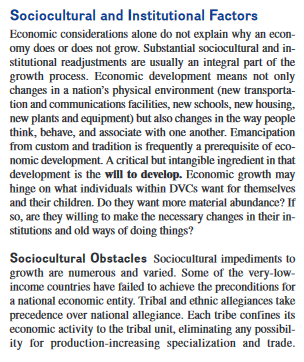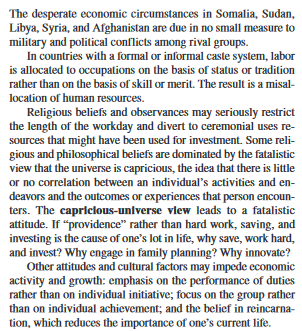So, recently in a Discord server with a couple of friends, we decided to look at an old economics textbook: the 14th edition of Economics: Principles, Problems, and Policies, published in 1998. We, as heterodox economists, had thought we were just going to have a chuckle at the nonsense that was mainstream economics at least in the late 90s. What we encountered, however, was nothing less than shocking.
This was their section on the sociological obstacles to economic growth in developing countries:


Now, we must remember that 70% of the world population lives in underdeveloped countries and the least developed countries are in Africa, and the authors of this textbook are American; in light of that, these passages are almost wholly racist. If I have to explain it, much of the reason why these underdeveloped countries are the way they are is because developed countries (namely the majority of Europe and America) have exploited their resources and labor, leaving them in the dust in comparison.
We, of course, had a disgusted chuckle to each other, noting how mainstream economists usually ignore imperialism and the analysis of it; I personally noted how my high school American history class managed to cover imperialism not only better, but more in-depth than this textbook. It was surprising looking at their coverage of developing countries and the "viscous cycle" didn't even mention how places like Europe or America had a role in underdeveloping Africa. It was a shame, we said, that this textbook likely got taught to classes at least 5 years after it was published.
We were curious what further versions of the textbook had to say about this same topic. It turns out it didn't change a single bit:
The fact that these racist lies were being pushed in 2017 (and likely still are in the 2021 edition) and are likely being taught in many classes through this textbook is not only disgusting, but also a dark reflection on the current state of mainstream economics. The second fact that this is published by the overly-expensive McGraw-Hill might leave salt on the wound, as well.
I am hoping, if anything else, to contact them about this textbook and the concerns I have over not only the accuracy of the claims made, but also the implications that are brought about by further, perhaps crude, consideration, i.e. Africa just doesn't want to develop and join everyone else in the economy. In the meanwhile, I'm hoping to bring awareness to this major flaw and perhaps in the future make a more focused criticism on the textbook's explanation of why underdeveloped countries came to be.


